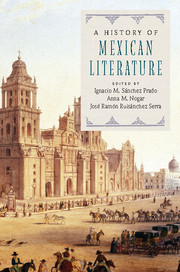Book contents
- Frontmatter
- Contents
- List of contributors
- Introduction
- PART I COLONIAL LITERATURE
- PART II THE NINETEENTH CENTURY
- PART III TWENTIETH AND TWENTY-FIRST CENTURIES
- 15 The Ateneo de la Juventud: The Foundations of Mexican Intellectual Culture
- 16 Regimes of the Avant-garde: Colonialists, Stridentists, Proletarians, Surrealists, Contemporáneos, and Independent Rupture (1920–1950)
- 17 The Institution of Fiction: From Yáñez, Rulfo, and Fuentes to Pitol and Del Paso
- 18 Octavio Paz: Literature, Modernity, Institutions
- 19 Mexican Poetry after the Avant-garde
- 20 Nonfictions: Essay, Criticism, and Chronicle
- 21 Balancing Acts: Twentieth- and Twenty-First-Century Mexican Theater
- 22 Women Writers in the Land of “Virile” Literature
- 23 The Hidden Histories of Gender: LGBTQ Writers and Subjectivities in Mexico
- 24 Mexican Literature in the Neoliberal Era
- PART IV MEXICAN LITERATURE BEYOND BOUNDARIES
- Index
- References
18 - Octavio Paz: Literature, Modernity, Institutions
from PART III - TWENTIETH AND TWENTY-FIRST CENTURIES
Published online by Cambridge University Press: 05 July 2016
- Frontmatter
- Contents
- List of contributors
- Introduction
- PART I COLONIAL LITERATURE
- PART II THE NINETEENTH CENTURY
- PART III TWENTIETH AND TWENTY-FIRST CENTURIES
- 15 The Ateneo de la Juventud: The Foundations of Mexican Intellectual Culture
- 16 Regimes of the Avant-garde: Colonialists, Stridentists, Proletarians, Surrealists, Contemporáneos, and Independent Rupture (1920–1950)
- 17 The Institution of Fiction: From Yáñez, Rulfo, and Fuentes to Pitol and Del Paso
- 18 Octavio Paz: Literature, Modernity, Institutions
- 19 Mexican Poetry after the Avant-garde
- 20 Nonfictions: Essay, Criticism, and Chronicle
- 21 Balancing Acts: Twentieth- and Twenty-First-Century Mexican Theater
- 22 Women Writers in the Land of “Virile” Literature
- 23 The Hidden Histories of Gender: LGBTQ Writers and Subjectivities in Mexico
- 24 Mexican Literature in the Neoliberal Era
- PART IV MEXICAN LITERATURE BEYOND BOUNDARIES
- Index
- References
Summary
Introduction
The Mexican poet and essayist Octavio Paz (1914–1998) had an extraordinarily rich and varied career, spanning more than six decades. Working in the symbolist and modernist traditions, he produced some of the most enduring poetic works of the modern era in Latin America. As an essayist, he wrote incisively and elegantly on a vast array of topics, including the Mexican national character, national and international politics, the visual arts, pre-Columbian civilizations, poetic theory, modernity and postmodernity, anthropology and religion, love and eroticism, and Asian cultures. A true public intellectual, Paz engaged constantly in political debates in Mexico, and many controversies swirled around him as he gradually shifted from a leftist and prorevolutionary position in the 1930s to a liberal democratic and promarket outlook in the 1980s and 1990s. Although he was deeply influenced by the romantic tradition in Western culture, he did not in the least cultivate the image and habits of the solitary genius; on the contrary, his artistic ethos had a strong social and group-oriented dimension. As a young man, he helped launch several collective cultural ventures in Mexico, including the journals Taller and El Hijo Pródigo. In his later years, he founded and directed two journals, Plural (1971–1976) and Vuelta (1976–1998), which are widely regarded as being among the most important cultural publications ever produced in Latin America. Octavio Paz was awarded the Nobel Prize in Literature in 1990, the only Mexican author to have received the prize thus far.
Politics
Paz was the grandson of Ireneo Paz, a prominent liberal newspaper editor and novelist, and the son of Octavio Paz Solórzano, a lawyer who worked for the Mexican revolutionary Emiliano Zapata. The young poet came of age in the 1930s, a highly politicized era, and he was drawn early on to a Marxist ideology. Although his critics describe him as a neoliberal or conservative thinker, Paz's roots are on the left, and he maintained a strong attachment to socialist ideals until the very end of his life. Commentators on Paz's intellectual career have often tried to determine when he broke with the Left.
- Type
- Chapter
- Information
- A History of Mexican Literature , pp. 278 - 294Publisher: Cambridge University PressPrint publication year: 2016
References
- 1
- Cited by



